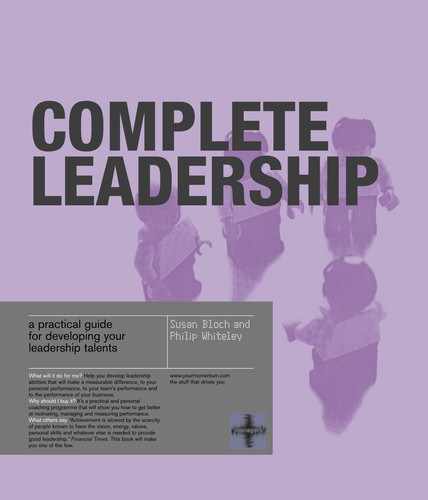point here is that it was not. It is also notable that Dave sought to
establish a good rapport with his small team, indicating that the
affiliative style was employed; he also undertook some of the hands-
on work himself, indicating a degree of pace-setting. The three styles
highlighted above, however, were the dominant ones.
Emotional intelligence
Added to the six leadership styles, a complete leader will be
emotionally intelligent. Much has been written about this concept
since it was first defined by Daniel Goleman and others in the 1990s.
as discussed in Chapter 2, there can be an unfortunate tendency to
write off ‘emotional’ or personal qualities as being ‘soft’ or ‘pink and
fluffy’, subordinate to the ‘hard’ matters of accountancy and strategic
analysis. We hope that we convinced you that a choice, or an
elevation, of emotional above rational qualities – or vice versa – is
not appropriate.
The point in emphasizing emotional intelligence is that it has been
traditionally neglected in the development of managers and the
MBA curriculum. How we manage people; how we motivate, how
we handle the day-to-day negotiations, meetings and politics of real
life, is how we manage. It can’t be segregated or treated as a junior
matter.
Any executive today will tell you of the skills-building courses they
have attended. These range from formal academic learning in
accountancy, law and business, ranging from cost analysis,
calculation of profit margins, structural effectiveness and processes.
However, most managers today have received little training or
development in empathy, integrity, or how to be an inspiring leader.
These are the foundation stones of emotionally intelligent leadership.
But research shows that what distinguishes the real leadership stars
is still neglected when we build on high flyers’ talents. There is still
little appreciation that most of us are evaluated by our colleagues,
bosses, direct reports and, importantly, by the external stakeholders,
including journalists, investors and customers, not only by how
momentum complete leadership chapter three
65
pages 64 /

‘clever’ we are, but also as to whether they like and trust us.
Behaviours and habits built around demonstrating empathy,
managing self and others, self-awareness, influence and trust are
measures that are increasingly being used in hiring and promoting
managers.
Alex’s story
As Alex was standing in the plush lobby of a building in Mayfair in London’s West End,
on his way to an interview with a top search consultant, he was shouting down his
mobile at his secretary, completely unaware that the receptionist from the firm had
crossed the lobby after her lunch break.
His meeting was doomed before it started. The receptionist was friendly and polite
when he entered the waiting room, but later went on to warn the headhunter that Alex
‘has an awful temper . . .’
Ye s, moods are contagious, and no one wants to work for a grouchy boss. We all know
how energized we feel when our manager communicates with us, and listens to our
concerns and advice. The boss that gave us self-confidence and took our personal
and career development seriously will always be remembered.
Alex was also regarded by his team as being rigid, out only for his own good. He was
blocked from moving from the regional operational director to the CEO role in his
present organization and struggled to come to terms with the fact that the chairman
found him difficult to connect with. Despite the fact that he had received this
feedback from the personnel director, Alex insisted it wasn’t him. After all everyone
knew how good his analytical and conceptual skills were. Technically, there was no
one to touch him. No wonder he was out in the market looking for the top job if they
were not going to promote him. After months on the market and no job offers, he
sought the advice of a coach to help him move on.

momentum complete leadership chapter three
67
pages 66 /
It took Alex a while to come to terms with the fact that his commanding pace-setting
style was not making him well liked in the market. He was known to order people to
do things and to criticize them if they didn’t do it his way. Slowly, he began to realize
how this had been helpful when he had needed to turn around the business in Japan,
and then South America; but these had been exceptional circumstances that were
unlikely to recur frequently. It began to dawn on him that long-term success was not
going to be gained by pushing and firing.
Years of research carried out by Daniel Goleman and the Hay Group provide statistical
evidence that emotional intelligence is particularly central to leadership.
19
The more
senior your position in the business, the more important political awareness,
adaptability, developing others and initiative become. When senior executives derail it’s
usually because they are defensive, arrogant, moody and insensitive to others’ views
and needs. They were unable to build teams where co-operation and trust were
evident, and were dependent on the coercive and pace-setting management styles.
Decades of research and practical application
20
have convinced us that people can
change . . . if they want to. It does take an emotionally intelligent approach to
recognize that these skills can be learnt. Habits which are now not working for us can
be undone, and replaced with new and helpful ones. All it takes is time, practice and
motivation.
At 36, ambitious and upset that his career had stalled, having begun so well since
graduating from Stamford with an MBA, Alex began to recognize that he needed to
change some of his behaviours. It was the concrete evidence and research that
convinced him that he needed to do so, and he embarked on the journey with as
much energy as other missions in his life. He was not accustomed to losing.
Thinking it would be easy for someone of his intellect and energy, he drew up a series
of objectives and plans as to how he was going to make sure he met them. What he
didn’t want to recognize was how much of an automaton he had become, and how
hard it was to shift some of the management routines he had developed. He agreed
to learn about the perceptions of others around him and completed a 360-degree

It’s not difficult to assess one’s style, and gauge organizational
climate. The following questionnaires can help, and can be
repeated after intervals to check progress.
emotional intelligence competency. He also asked his team to fill in an upward
feedback on management style. Alex was shocked to see how blind he had been. He
had relied on integrity and intellect to get him to where he was. He also realized that
being sensitive to others was quite easy when things were going well. When he
became nervous or tired, especially after long transatlantic flights, he became irritable
and had more rows with others. He had also got into the habit of regularly taking
sleeping pills with a strong scotch as soon as he got on the flight to help him sleep.
No wonder he felt heavy and grumpy when he went straight into the office. He began
to take regular breaks and holidays. He hadn’t had a day off for 18 months so this
was a difficult change for him. He also decided to focus on only two things to start off
with, listening and self-awareness. Listening to others was really difficult as mostly he
thought he knew the answers anyway. He knew the pay-off was beginning when his
secretary seemed less nervous and began to make fewer mistakes. He also began to
enjoy the company of his colleagues more.
His coach recognized Alex’s talents and strengths and worked with him intensively
over a period of six months. Time, effort and practice began to pay off. Helping Alex
understand how his behaviour impacted on him, his coach was hugely helpful to him,
especially when Alex was unaware how stern he could appear to be. He was
beginning to ‘rewire’ his brain.

momentum complete leadership chapter three
69
pages 68 /
MANAGEMENT STYLE QUESTIONNAIRE
Here are some questions to help you think through what your
dominant management style is. Rate yourself on a scale of 0 to 100
on each measure, and ask your team to rate you as well.
1 You believe that a high standard of performance is the most
critical theme for success, and you are intolerant of people who
do not reach your standards (
coercive
).
Rating
____________
2 You believe you have a happy team and that being responsive to
how they’re feeling is more important than the job at hand
(
affiliative
).
Rating ____________
3 When you come up with a vision or a decision, you work at
inspiring your team to accept it (
authoritative
).
Rating ____________
4 The only way to achieve results is by firm discipline (
coercive
).
Rating ____________
5 You help people develop by giving them the opportunity to
participate and be heard (
democratic
).
Rating ____________
6 You discourage people to have arguments, which may lead to
conflict (
affiliative
).
Rating ____________
..................Content has been hidden....................
You can't read the all page of ebook, please click here login for view all page.
